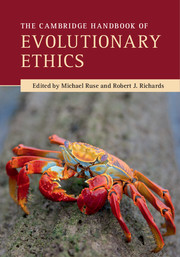2 results in Cambridge Handbooks in Philosophy

The Cambridge Handbook of the Just War
-
- Published online:
- 01 February 2018
- Print publication:
- 15 February 2018

The Cambridge Handbook of Evolutionary Ethics
-
- Published online:
- 31 August 2017
- Print publication:
- 11 August 2017

